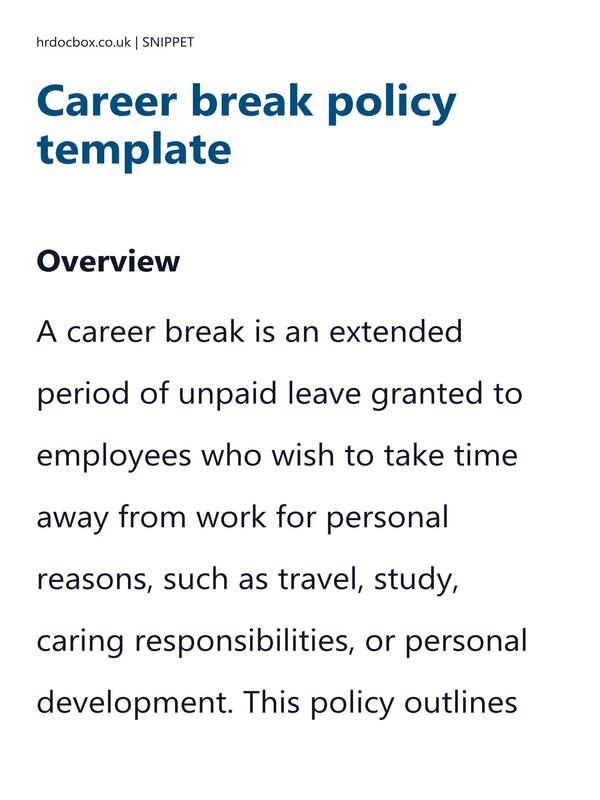Career break policy template


A practical career break policy template that supports extended employee leave while balancing organisational needs.
- Includes 12 months' access to the Career break policy template, with all updates provided free of charge and notified to you.
- UK-specific accuracy.
- 398 words over 2 pages.
- Last updated 08/11/2025.
- Format: Word / plain text / email.
- Delivery: Instant download after purchase (no physical item).
- Access: Download link shown here after checkout.
- This Career break policy template will SAVE you up to 1 hour drafting & research, save you money, and reduce your risk.
Career break policy
1 Overview
1.1 A career break is an extended period of unpaid leave granted to employees who wish to take time away from work for personal reasons, such as travel, study, caring responsibilities, or personal development. This policy outlines the eligibility criteria, application process, and key principles governing career breaks to ensure fairness and consistency across the organisation.
2 Scope
2.1 This policy applies to all eligible employees who meet the criteria outlined below. It ensures that career breaks are granted fairly and consistently, balancing employee needs with business requirements.
3 General Principles
3.1 Eligibility
3.1.1 Career breaks are available to employees with a minimum of [X] years of continuous service.
Employees must have a satisfactory performance record and not be subject to any ongoing
This is a 30% preview of the Career break policy template. For instant full access, purchase this item or a parent bundle.
Career break policy template purpose
This policy template helps organisations provide a structured approach to career breaks, allowing employees to take extended time away from work for personal, family, or developmental reasons.
It sets out clear eligibility, application, and approval processes, helping both managers and employees manage expectations and responsibilities.
By adopting this policy, employers show commitment to flexibility, retention, and employee wellbeing, while ensuring business continuity and fairness across the workforce.
Practical application of a Career break policy template
- Issue the Career break policy template during onboarding / after changes / planned refresher.
- Send it to appropriate internal recipients such as employees, workers, contractors etc. and request confirmation that is has been read and understood.
Frequently Asked Questions about a Career break policy template
Frequently Asked Questions about a Career break policy template
-
Can I use the Career break policy template in my small business?
Yes. The Career break policy template is designed to be flexible and suitable for organisations of all sizes, including small businesses and charities. It follows UK employment law best practice, so even if you don't have an in-house HR team, you can confidently apply it.
-
Is the Career break policy template compliant with 2026 UK employment law?
Absolutely. Like the Career break policy template, all of our templates are drafted with the latest ACAS guidance and UK employment legislation in mind. We review and update them regularly, so you can be confident they remain compliant.
-
Can I customise the Career break policy template for my organisation?
Yes, we highlight the areas of the Career break policy template that you need to update with your own details, and where you need to make decisions to suit your situation. This saves you time and ensures that you meet best practice.
-
Do I get instant access to the Career break policy template?
Yes. Once purchased, you'll be able to download the Career break policy template instantly. Templates are provided in editable Word or Excel format so you can customise them easily, and in PDF format for easy sharing.
-
What if I need more help, not just a Career break policy template?
If you're looking for broader support, we also offer toolkits and library bundles that include the Career break policy template, along with other HR templates and policies for fully managing your situation. These may be more cost-effective if you need deeper advice.
-
Why should I use this Career break policy template, and not AI to generate it?
The risk of using a free AI-generated template 'without review' includes your legal exposure, missing context, and no awareness of the wider process, whereas purchasing the Career break policy template from us mitigates that risk.
